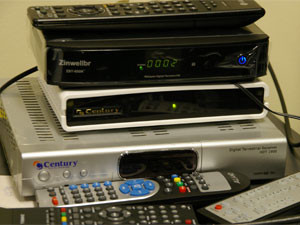
The Right2Know Campaign and the SOS Coalition will stage a protest for free set-top boxes outside the Universal Service and Access Agency of SA's (USAASA's) offices tomorrow.
The organisations say every household in the country will need a set-top box (STB) to continue receiving TV signals after SA switches to digital broadcasting. However, they claim, despite an STB subsidy having been announced for low-income households, the process to prove that one qualifies for the subsidy is too onerous.
"It is estimated that a set-top box will cost between R700 and R750 in every home. Everyone needs to buy one, but this cost is unaffordable to many. Government has said they could give a discount to poorer citizens, but only if you can prove you are poor through a long application process.
"As the R2K Campaign and the SOS Coalition, we demand that set-top boxes be made available free of charge to all who need them. The government can afford to supply free set-top boxes to everyone. Why in SA should the people pay to continue receiving free-to-air TV (something that is supposed to be free)?"
The protest is set to take place outside USAASA's offices, at Thornhill Office Park, 94 Bekker Road, Vorna Valley, in Midrand, between 11am and 1pm.
USAASA has been tasked with rolling out a subsidy scheme to poorer households for the set-top boxes. "But, you can only get this subsidy if you can prove that you are poor - you have to provide a lot of documents showing that you can't afford to pay the full price of the set-top box."
Criteria for subsidies
USAASA last month published the criteria under which South Africans can qualify for a subsidised STB. The subsidies proposed for terrestrial set-top boxes range from 66% for no-income households, to 15% for those earning up to R2 499 a month.
In areas needing satellite transmission, the subsidy ranges from 77% for no-or-low income households, to 29% for those with an income up to R3 200 a month.
Subsidies will apply only to valid TV licence-holders, including concessionary TV licence-holders, and upon proof of ownership of an operational TV set, South African citizenship and household income or dependency on social grants.
Currently, the country's broadcast digital migration policy is bogged down in Cabinet for final approval, and no progress has been seen regarding this matter for the past few months. This policy will pave the way for the tender for subsidised boxes to be issued, which will then allow SA to turn on digital TV.
Share